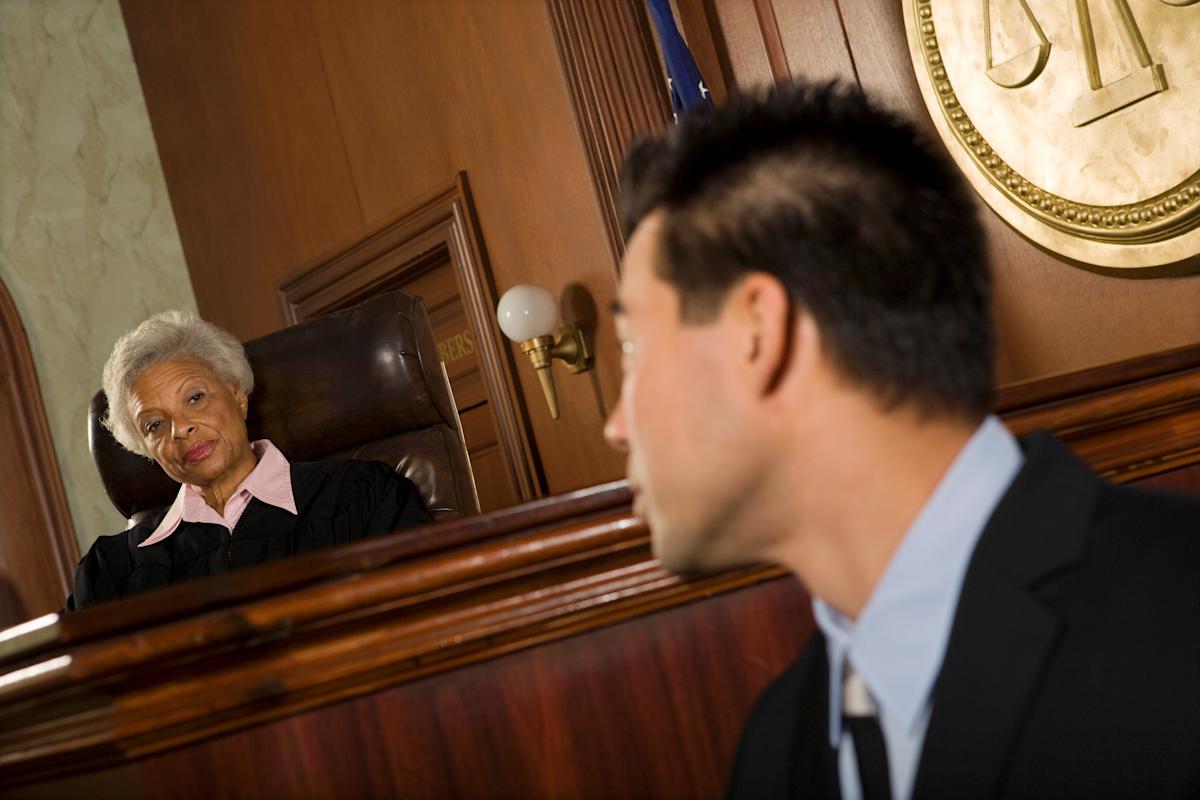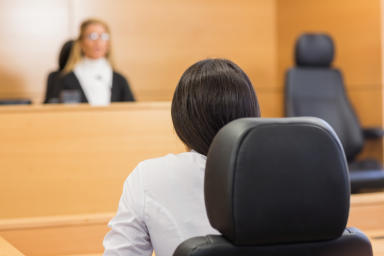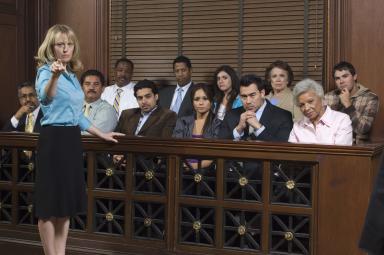Can I Represent Myself in a Criminal Trial?

Navigating a criminal trial without legal representation can be daunting, but it’s a reality that many defendants face. In fact, according to the National Association of Criminal Defense Lawyers, approximately 80% of United States criminal defendants cannot afford a private attorney and must rely on court-appointed counsel or represent themselves.
This article provides a step-by-step guide on preparing for and representing oneself in a criminal trial, offering valuable information and legal resources such as court clerk's offices, law libraries, and legal aid organizations. By following these steps and utilizing available resources, defendants can increase their chances of success in their cases. With the proper preparation and a strong understanding of the legal process, defendants can effectively represent themselves in court and achieve a fair outcome.
Am I Allowed to Represent Myself in a Criminal Case?
Yes. In the United States, individuals have the right to represent themselves in a criminal case, but it is generally not recommended. Criminal cases can be complex, and legal procedures and rules can be challenging to navigate without legal training and experience. Having a criminal defense lawyer who understands the law and the legal system can significantly increase your chances of achieving a positive outcome in your case.
That said, it is still possible to represent yourself in a criminal trial and have a successful outcome. This article will provide some essential tips for preparing for a criminal trial if you represent yourself. From understanding the charges against you to presenting a solid defense, we will cover the key steps you must take to navigate the criminal justice system and protect your rights effectively.
Appearing Pro Se | How to Prepare
Appearing pro se is a Latin term that means representing oneself in a legal proceeding. It is also commonly known as self-representation or appearing pro per. In criminal cases, appearing pro se means that the defendant will be responsible for their defense, including preparing and presenting evidence, cross-examining witnesses, and arguing their case before the judge or jury.
Understand the Charges
Understanding the charges against you is critical to preparing for a criminal trial. To prepare, first review the charging document, typically called the complaint or the indictment, to identify the charges against you. Next, research the laws that best apply to the charges to better understand the crime's elements and identify possible defenses that may apply. Even if you are representing yourself, this is an excellent time to consult a criminal defense attorney to help you develop a defense strategy.
Familiarize Yourself with Court Procedures
Familiarizing yourself with court procedures is essential when representing yourself in a criminal case. By researching local court rules, attending court proceedings, consulting with court staff, and studying the rules of evidence and court forms, you can better prepare yourself for the trial and ensure that you follow the necessary procedures.
Most courts have websites that provide information about court procedures, rules, and forms. In addition, law libraries have extensive collections of legal materials, including court rules, case law, and legal forms. They may also offer research assistance and access to legal databases.
Prepare Your Evidence
Preparing evidence is crucial when representing yourself in a criminal trial:
Review the charging document and research the applicable laws to identify the evidence that supports your defense.
Collect physical evidence like documents, photographs, or objects and gather witness testimonies. These elements can be powerful tools to help the judge or jury see your perspective.
Organize your evidence to make it easy to present during the trial.
Label and number each exhibit and create an index to help you quickly locate and present it during the trial.
Develop a Defense Strategy
Developing a defense strategy requires a thorough understanding of the law. Therefore, you should carefully research the applicable laws and legal precedents that apply to your case, as this will help identify legal arguments to support your defense. In addition, be sure to thoroughly review the evidence against you to identify any weaknesses in the prosecution's case. This can help you challenge their evidence or raise reasonable doubt on the jury's behalf.
After you have conducted the appropriate research and reviewed the evidence against you, develop a theory of the case. This theory should clearly and concisely explain what happened and why you are not guilty. Then, create a persuasive argument that supports your defense theory. Use your research and the evidence to develop legal and factual arguments that challenge the prosecution's case. Lastly, consider how the prosecution will present their case and develop strategies to challenge their evidence and arguments.
Prepare for Cross-Examination
Preparing to be cross-examined is an essential part of representing yourself in a criminal trial. First, review your testimony carefully before the trial. This will help you recall the details of your testimony and identify any areas where you may be vulnerable to cross-examination. Consider the types of questions the prosecution may ask you, and anticipate questions that challenge your credibility or raise doubts about your testimony.
Next, prepare your responses based on anticipating the prosecution's questions. Your answers must be clear and concise, and you should focus on reinforcing your testimony and defending against any potential attacks. To become more comfortable with the process, practice answering potential cross-examination questions out loud.
Dress Professionally
When appearing in court for a trial, it's essential to dress appropriately and professionally. How you present yourself in court can influence the judge, jury, and other court officials and can impact the outcome of your case. Here are some general guidelines to follow:
Choose clothing that is conservative, understated, and respectful. Avoid clothing that is provocative or distracting.
Dress in business attire, such as a suit, dress slacks, skirt with a blouse, or a dress shirt and tie.
Avoid wearing casual clothing like jeans, shorts, t-shirts, or sneakers.
If you have visible tattoos or piercings, cover them or remove them for your court appearance.
Ensure your hair is neatly styled and your nails clean and trimmed.
Know Your Rights
Defendants must know their rights before representing themselves in a criminal trial because they will be responsible for protecting those rights throughout the trial. Knowing your rights can help you protect yourself against self-incrimination, understand the charges, ensure a fair trial and due process, and protect against illegal search and seizure.
To learn more about your rights, visit the courthouse's law library. Many courthouses have law libraries that are open to the public. Law librarians can assist with legal research and provide access to essential resources like law books, legal journals, and online legal databases.
Can I Change My Mind and Hire a Criminal Defense Lawyer?
Yes, a defendant can change their mind and hire a criminal defense lawyer at any point during their criminal case, even if they have previously decided to represent themselves. However, hiring a lawyer later may be more challenging as the lawyer will have to catch up on the case and may need more time to prepare a defense.
If a defendant decides to hire a criminal defense lawyer, they should notify the court and the prosecution immediately. The defendant's lawyer will then file an appearance in the case, indicating that they now represent the defendant. The defendant should also communicate with their lawyer to ensure they have all the necessary information and evidence to represent them effectively in court.
Legal Resources for Defendants
Defendants representing themselves in a criminal trial may find the legal system complex and daunting. However, numerous legal resources are available to help navigate the process, including court clerk's offices, law libraries, and legal aid organizations. The following list provides defendants with a brief overview and information on contacting local resources.
Court Clerk’s Offices
The court clerk's office can be an invaluable resource for defendants representing themselves in a criminal trial. They can provide access to the necessary forms to file a case, inform defendants of filing requirements, and schedule hearings. However, it's important to note that clerks cannot provide legal advice or representation. Defendants should seek the advice of a qualified criminal defense attorney if they have questions about their legal rights or need legal representation.
To find your local court clerk’s office, visit The National Center for State Courts to access an online court directory or conduct an online search using your location and keywords like “court clerk’s office” or “county courthouse.”
Law Libraries
Law libraries offer access to a wide range of legal resources, such as books, journals, and online databases, which can help defendants understand the law and legal procedures relevant to their cases. Law librarians or staff members can also assist with legal research and help defendants navigate legal databases to find the information they need.
Law libraries may also have copies of legal forms and documents that defendants must file with the court, such as motions and pleadings. In addition, some law libraries offer workshops and training sessions on legal topics, including court procedures and legal research, which can be helpful for defendants representing themselves in a criminal trial.
The American Association of Law Libraries (AALL) provides a directory of law libraries across the United States. Search by state, city, or zip code on their website to find your local law library.
Legal Aid Organizations
Legal aid organizations are non-profit organizations that provide free or low-cost legal assistance to individuals who cannot afford a private attorney. They often have staff attorneys and volunteers who can provide legal advice and representation to individuals in criminal cases.
Legal aid organizations can help defendants understand their legal rights, the charges against them, and the potential consequences of their case. They may also assist with legal research, document preparation, and court filings.
Individuals must meet specific eligibility criteria based on income and other factors to access legal aid services. To find a legal aid organization in your area, visit the directory from the Legal Services Corporation or conduct an online search.
Expertise.com StaffAuthor
Step into the world of Expertise.com, your go-to hub for credible insights. We don't take accuracy lightly around here. Our squad of expert reviewers, each a maestro in their field, has given the green light to every single article you'll find. From rigorous fact-checking to meticulous evaluations of service providers, we've got it all covered. So feel free to dive in and explore. The information you'll uncover has been stamped with the seal of approval by our top-notch experts.
Sources
This article provides a step-by-step guide on preparing for and representing oneself in a criminal trial, offering valuable information and legal resources such as court clerk's offices, law libraries, and legal aid organizations. By following these steps and utilizing available resources, defendants can increase their chances of success in their cases. With the proper preparation and a strong understanding of the legal process, defendants can effectively represent themselves in court and achieve a fair outcome. However, in most cases, it's probably best to retain representation from an experienced attorney.




